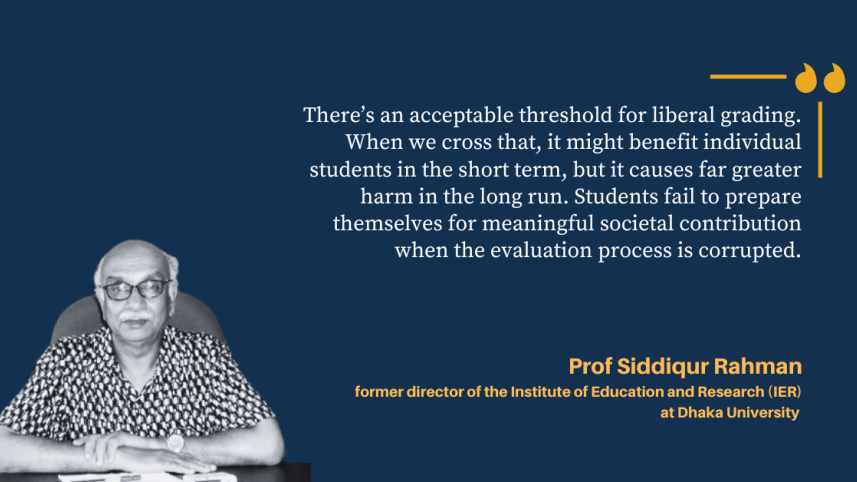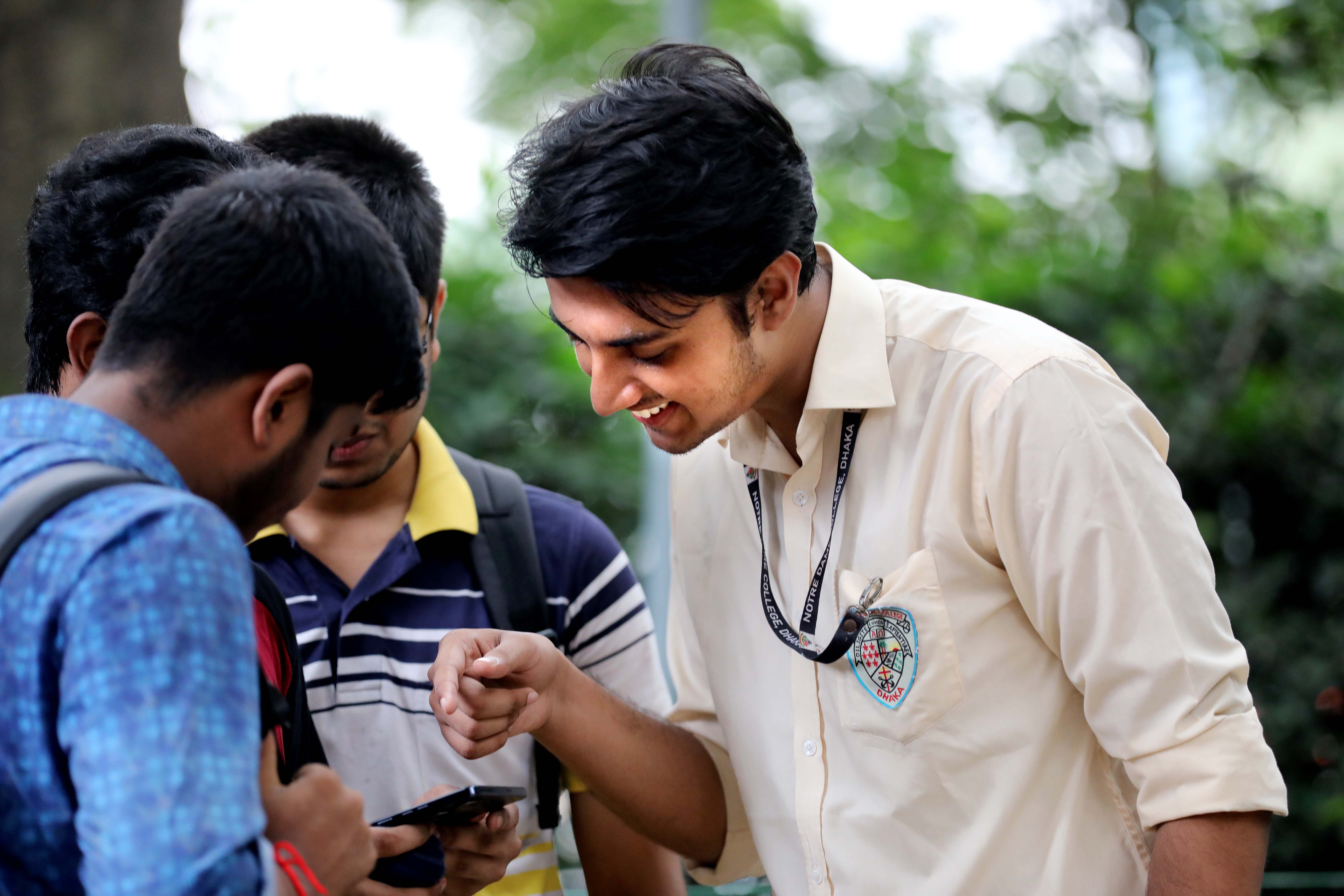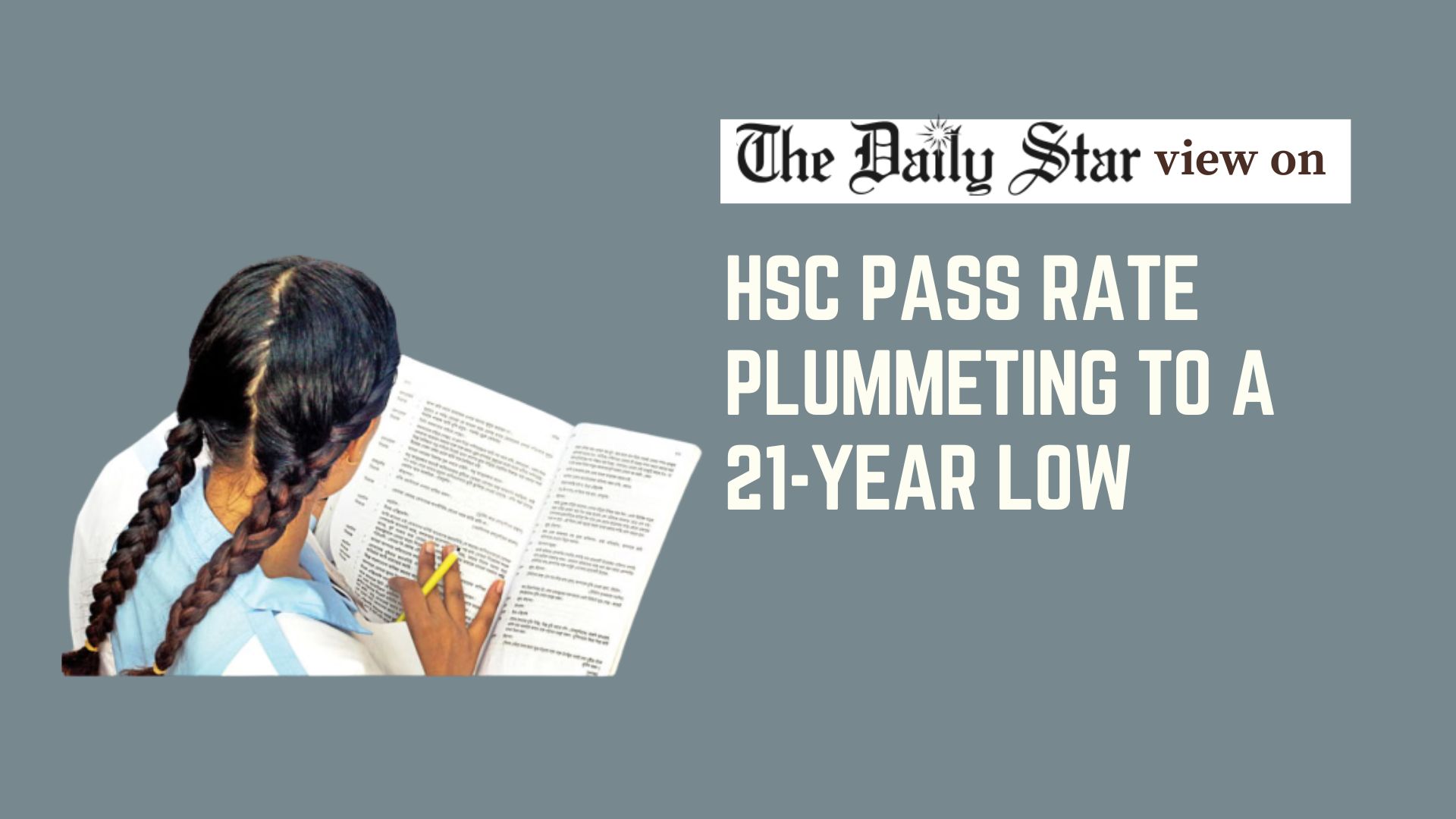'HSC-SSC results serve as a wake-up call for education reform'

Prof Siddiqur Rahman, former director of the Institute of Education and Research (IER) at Dhaka University, speaks with Mahiya Tabassum of The Daily Star about the recent HSC results and what they reveal about the state of Bangladesh's education system.
This year's HSC pass rate plummeted to 57.12 percent—the lowest in 21 years. Many are calling it a "return to reality," with some education board officials admitting that previous years' results were artificially inflated through a "sympathetic approach" to grading. As an expert, how do you interpret this shift?
Over the years, we've witnessed a persistent tendency to award grace marks to help students pass. There were even instructions to award marks simply for attempting an answer, regardless of whether it was correct. This practice, to a considerable extent, depended on directives from exam controllers and senior officials, and it led to the inflated results we saw for years.
There's an acceptable threshold for liberal grading. When we cross that, it might benefit individual students in the short term, but it causes far greater harm in the long run. Students fail to prepare themselves for meaningful societal contribution when the evaluation process is corrupted.
There's also been a concerning trend to manipulate grades by exploiting personal connections, especially in practical exams, which often results in suspicious gaps between theory and practical marks. This indicates deeper corruption within the system. We need a comprehensive overhaul in the system. However, change often causes disruption, but stakeholders, including relevant authorities,are not always willing to endure the process and relevant challenges.
Earlier this year, we witnessed the same outcome following SSC exams. Do you think this shift to strict evaluation will rebuild credibility in public examinations, or will it discourage students and parents long accustomed to inflated grades?
It will definitely have a positive impact. It is only fair that a student achieves the grade they deserve. This year's SSC and HSC results both serve as a wake-up call to take a critical look at our education system. At the same time, the evaluation process, starting with setting exam questions, must be "valid," "reliable," and "applicable." If any one of these characteristics is missing, the system loses credibility. Reliability is crucial. We check the reliability of a question paper by running tests and retests, where a student is evaluated more than once based on the same question paper and performs similarly each time. It shows consistency and proves the reliability of the question paper.
Question papers must meet certain quality standards, and the exam hall environment is equally crucial. The evaluation process loses validity if the proper code of conduct is not maintained in the exam hall. Currently, we're not in a good place with our evaluation process. This is primarily because the people responsible for preparing question papers have limited expertise. In different countries, examination specialists are specifically appointed to education boards for this purpose. We don't rigorously follow that practice here.
The National Curriculum and Textbook Board (NCTB) introduced revised syllabi aimed at promoting analytical thinking. Have these reforms reached classrooms meaningfully, or do they remain limited to paper and policy?
I was directly involved in revamping the curriculum in 2012. It was revised in 2021, again in 2022 when I served as chief consultant, and in 2023. The curriculum we have today is essentially a refurbished version of the 2012 framework. There are a few issues with the existing curriculum, and one of them is the massive gap between the prescribed version and the implemented version. I've supervised three research studies at Master's and PhD levels at Dhaka University, which specifically examined this disconnect. There are several reasons for this failure in implementation.
First, teachers often lack commitment and sincerity. Second, there's an acute shortage of adequate educational resources. Third, institutional administration fails to provide teachers with the necessary resources and opportunities to adopt curricula introduced by NCTB. Fourth, there's a lack of effort from government bodies. There should be regular audits and actions by relevant government agencies to facilitate implementation—for example, classroom visits and constructive feedback based on observations. They're extremely reluctant to follow through on these responsibilities.
For years, Bangladesh recorded high pass rates and record numbers of GPA-5 achievers, yet the graduate unemployment rate remains alarmingly high. Do you think the inflation of results contributed to this disconnect between education and employability?
I don't think high pass rates and record GPA-5 numbers directly cause graduate unemployment. The reality is that there's only a limited scope for white-collar jobs in our country. Such positions aren't being created in proportion to the number of fresh graduates we produce every year. This is one of the two aspects of this issue. The second one is that many graduates who get recruited fail to meet the required skill levels.
Bangladesh doesn't have a 100 percent graduation rate, and it does not need to. We need people across a diverse range of sectors. Therefore, education should be compulsory and facilitated only up to a certain level, say secondary or higher secondary. Beyond that, students should be channelled into pathways that align with their skills and interests—whether academic, vocational, or technical—so that their education leads to meaningful outcomes.This approach would also accelerate economic progress.
But no matter how much we improve our education system, we cannot guarantee employment for every graduate. Hence, we must diversify both our education pathways and job sectors, placing far greater emphasis on vocational and technical education.
What specific reforms do we need to transform the trajectory of secondary and higher secondary education?
We must ensure foundational education up to a certain level, then allocate higher education opportunities based on merit and aptitude. We need some fundamental changes to our curriculum, including a shift away from the memorisation-based system.
We also need to ensure the quality of our educators. People who are meritorious and genuinely passionate about teaching need better facilities and incentives so they're motivated to choose this profession. Educators must become more proactive in classrooms, enabling critical and creative thinking among students.
We cannot rely on a memorisation-based system anymore. If we fail to ensure quality education, we cannot expect to produce better students or even an efficient workforce.
Follow The Daily Star Opinion on Facebook for the latest opinions, commentaries and analyses by experts and professionals. To contribute your article or letter to The Daily Star Opinion, see our guidelines for submission.




 For all latest news, follow The Daily Star's Google News channel.
For all latest news, follow The Daily Star's Google News channel. 


Comments